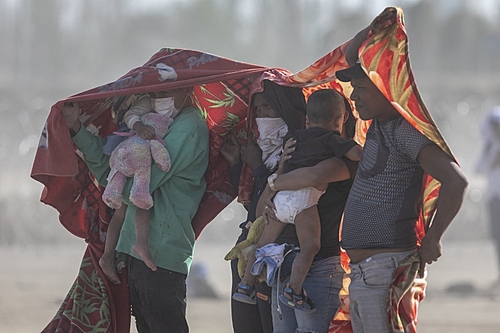
The so-called Title 42, a rule imposed by the US government at the beginning of the pandemic that made it virtually impossible to seek asylum in the United States, will expire at the end of Thursday (11), further inflaming the already heated debate on immigration in the country.
Meanwhile, thousands of migrants have been crossing the southern US border in recent days, fearing new policies will make it even harder to gain entry into the country, while others flock to the Mexican side amid a lack of clarity over US rules. Military forces have been deployed to help border control agents deal with an expected increase in migrants, mostly from Latin America, seeking refuge in the world’s richest country.
Title 42 was implemented in March 2020 by the administration of former President Donald Trump as a public health measure amid the COVID-19 crisis. Maintained by the current president, Joe Biden, federal policy allows for the rapid deportation of migrants who cross the border illegally, without even analyzing any asylum applications.
It is estimated that, between March 2020 and March 2023, Title 42 was used as the basis for promoting 2.8 million expulsions from the US. This Thursday, however, the declaration of health emergency in the country due to covid-19 comes to an end, also causing the expiration of Title 42, imposed in theory to keep infections under control. The measure ceases to be valid at the last minute of this Thursday, Washington time.
What happens now?
Washington predicts a massive arrival of migrants across the southern border. Fearing a “chaotic” situation, President Biden has 24,000 agents on the border with Mexico to assist migrants entering the country through “legal channels” – and expel the rest.
“We don’t know what’s coming the next day [ao fim da medida]we don’t know what’s coming in the next 10 days,” said Oscar Leeser, mayor of the city of El Paso, Texas, one of the busiest crossings on the 3,000-kilometer-long border between the US and Mexico. “We know that they will keep coming and we will keep making sure we help them.”
In theory, suspending Title 42 will allow migrants crossing the border to assert their right to seek asylum and have their case reviewed by authorities. The process can take months or even years. For the first few days, they will be held in detention centers.
Those who are expelled may be deported to Mexico if they are Cuban, Venezuelan or Nicaraguan nationals.
:: Biden under pressure to ease sanctions on Venezuela ::
Members of the opposition Republican Party criticized Biden for allowing Title 42 to expire, claiming that the Democrat was opening the country’s doors to migrants. One of the party’s leading voices, former President Trump said it would be a “day of infamy”. “There will be millions of people coming into our country,” he said on Wednesday.
Many migrants have crossed the border into the US in recent days, awaiting the end of Title 42, while thousands crowd into border areas in Mexico – many of them uncertain about when or how to cross. Drone footage shows crowds gathered at the border fence between El Paso, Texas, and Ciudad Juarez, Mexico.
new obstacles
But the hope of gaining asylum in the US stumbles upon other obstacles. First, the most basic: the laws in force, which make it illegal in the country for those arriving on irregular crossings.
In addition, a new regulation takes effect this Thursday, defining that only those who have already applied for asylum in another country and had their application denied can apply for asylum in the US. The new rule marks a fundamental shift in US immigration policy.
“Anyone who crosses the border will have to prove that they applied for asylum in Mexico and were denied, in order to be able to enter the US and apply there. If they don’t, that person will be placed in deportation proceedings and will be expelled to Mexico or to another country,” Ariel Ruiz, an expert at the Washington-based think tank Migration Policy Institute, told DW.
Anyone who is deported will be barred from entering the country for at least five years, and could face criminal prosecution for any subsequent attempts to cross the border illegally.
The government claims that, with the new measure, it seeks to prevent irregular crossings. “Our overall approach is to create legal pathways for people to come to the United States, and impose harsher consequences on those who choose not to use those pathways,” said Homeland Security Secretary Alejandro Mayorkas.
“We are making it very clear that our border is not open, that irregular crossing is against the law and that anyone who is not eligible for asylum will be deported swiftly,” added Mayorkas.
That threat seems to be raising awareness on the Texas border. In an interview with the AFP news agency, a Venezuelan migrant said he would not risk an illegal crossing of the river. “We will lose all rights to the legal process. They can automatically send us away because we entered illegally”, says Andrés Sanchez.
Application makes it even more difficult
But even for those who comply with all the rules, another obstacle makes the US asylum process even more difficult. Migrants need to file their asylum application online, using an application.
While some don’t even have access to the internet or a cell phone, many still report problems with the app. “It’s stuck,” says Ronald Huerta, a Venezuelan in the Mexican city of Ciudad Juarez, who on Wednesday was unable to get past the app’s language settings page.
For others, the app seemed to struggle with registering their faces. “It’s like a game of chance. He recognizes who he wants,” says Jeremy De Pablos. “It’s amazing that an app practically decides our lives and our future.”
ek/cn (AFP, AP, Reuters, DW)
Source: www.brasildefato.com.br

